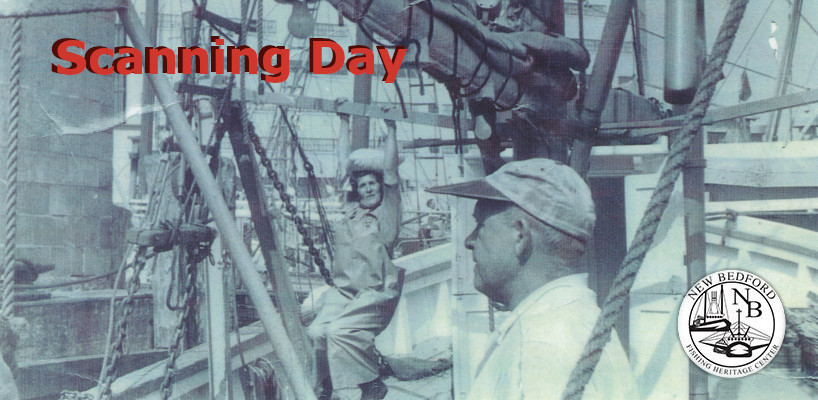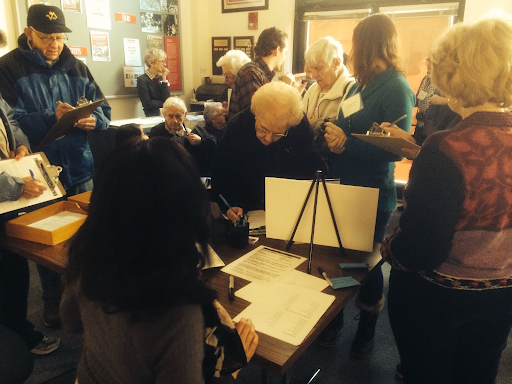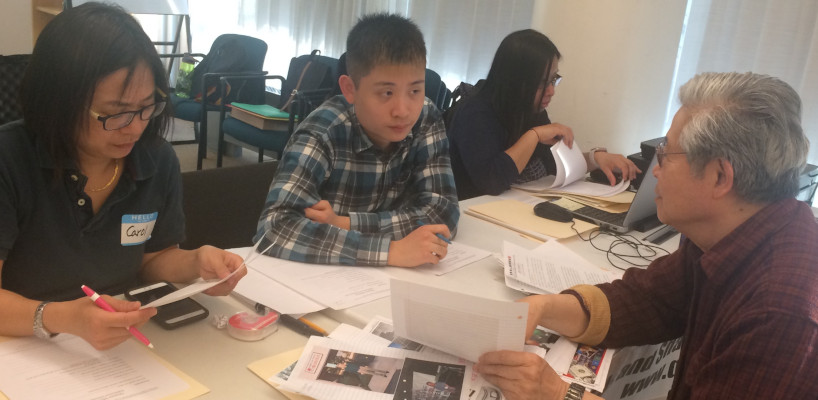At the event, the community gathers to build the collection. To ensure that everything runs smoothly on the event day, there are a range of logistics involved in planning and executing a participatory archiving event. Choosing a location, date, and time; arranging the stations with required furniture, equipment, and supplies; and recruiting, training, and feeding volunteers all require advance planning and communication among all Project Team members.
Roles & Responsibilities
For an overview of all RoPA Roles and Responsibilities, please review the Building a Team module.
The Event Coordinator will plan all of the logistics that come together on the event day. They are responsible for making sure that the day runs smoothly and that the event room is set up properly in advance with all required equipment and supplies including a sufficient number of paper copies of the Event Registration and Permission Forms (download as MS Word or PDF document) and the Descriptive Information Forms (download as MS Word or PDF document). The Event Coordinator will recruit a strong team of volunteers prepared to work effectively together. At the end of the event, the Event Coordinator will confirm that the Collection Coordinator has secured all the collection-related paperwork and digital files. They will also delegate specific tasks to other Project Team members, including the Event Working Group.
Before the event, the Collection Coordinator will be responsible for adapting and finalizing electronic versions of the Event Registration and Permission Forms (download as MS Word or PDF document) and the Descriptive Information Forms (download as MS Word or PDF document) in MS Word (or another word processing software) and handing this off to the Event Coordinator for printing. They will also support Station Captains in training volunteers about the specific stations. At the event, the Collection Coordinator is responsible for supporting station activities and answering contributors’ questions about the collection. In addition, they will conduct periodic backups, check forms for completion, and package all collection-related paperwork and digital files at the end of the day. The Collection Coordinator will also appoint Station Captains to run the stations at the event.
Before the event, the Community Coordinator will recruit volunteers to serve at the event as Event Working Group members. At the event, the Community Coordinator will serve in a support role and make sure that all contributors feel welcome. If your Project Team chooses to include Community Tables as a station, this person will be the liaison for the community groups displaying materials at these tables.
The Event Working Group includes all individuals who will be working at the event. Together, they will be responsible for all Contributor-focused activities at the event. The size of this working group depends largely on the number of people you expect to attend the event. For larger events (over 100 people), having 20-25 Working Group members will help ensure the day runs smoothly. For smaller events (fewer than 100 people) having 15-20 members may be acceptable. Event Working Group members could be staff and/or volunteers from libraries, historical societies, and other partner organizations on your Project Team. The Community Coordinator and the Community Working Group will recruit volunteers approximately one month in advance according to guidelines provided in the Engaging Participation module.
The Event Coordinator will work with members of the Event Working Group to create three station sub-groups: Welcome Station Volunteers, Information Station Volunteers, and Copying Station volunteers. These stations are described in detail in the Obtaining Permissions, Describing Items, and Copying Items modules of RoPA, respectively.
Regardless of your event size, you will need four to six volunteers at the Welcome Station: two to three to cover the Welcome Station table as Greeters and two to three to serve as Ushers. Greeters will welcome Contributors, explain the event, encourage participation, and manage nametags and Event Registration and Permission Forms. Ushers will guide Contributors from station to station and assist them in moving around the room, provide back-up, and show interest in Contributors’ Items and stories. All Welcome Station volunteers should be outgoing, friendly, able to answer questions about the event, and detail-oriented. At least one of these volunteers should be someone that is well-connected to the community and at least one should be someone who knows their way around the venue.
The RoPA Developers recommend that the Welcome Station Captain be a library, museum, or cultural organization staff member who is familiar with copyright and permissions. In addition, the Welcome Station Captain should have an outgoing personality, feel comfortable training volunteers, and have strong ties to the community. The Welcome Station Captain will lead the training for Welcome Station Volunteers during the Event Orientation and Training Session.
Depending on the size of your event, you will need eight to twelve volunteers for large events (100 people or more) or five to seven volunteers for smaller events (less than 100 people) to work one-on-one with each Contributor, helping them to select photos, complete and review Descriptive Information Forms. Individuals in this role should be good listeners, interested in hearing contributors’ stories, and able to ask questions to draw out additional details from Contributors. They also need to be detail-oriented to ensure the Descriptive Information Forms are complete and legible. It’s helpful if Information Station Volunteers are familiar with the community’s history and know how to handle old photographs.
The RoPA Developers recommend that the Information Station Captain be a library, museum, or cultural organization staff member who is familiar with personal narratives, oral history and/or descriptive metadata. The Information Station Captain will lead training for Information Station Volunteers during the Event Orientation and Training Session.
You will need six volunteers at three tables to work the Copying Station. Very large events (150+ people) may need eight volunteers at four tables; for very small events (less than 25 people) four volunteers at two tables may be sufficient. Each table has two volunteers: one Item Copier and one Reviewer. The Item Copier handles data entry and scanning. They should have experience using a scanner, scanning software, and renaming and saving files to a computer. The Reviewer manages paperwork and signs off on the Descriptive Information Form. The Reviewer should be detail-oriented to ensure forms are complete and legible.
The RoPA Developers recommend that the Copying Station Captain be a library, museum, or cultural organization staff member who is familiar with digitization, computers, and technology. The Copying Station Captain will lead training for Copying Station Volunteers during the Event Orientation and Training Session.
Depending on your community, your Project Team may decide to have translators and/or sign language interpreters available to assist Contributors at the event. The RoPA Developers recommend having translators and interpreters available at the Welcome Station to escort individuals through the whole participatory archiving process, accompanying them to each of the stations.
Steps to Success
Download a Quick Checklist of the Coordinating Logistics steps here.
Best Practice Examples
Do you know of a project or program that could be featured here? Please contact us.
Resources
The Culture In Transit Toolkit is separated into three parts: community, institution, and equipment. Each of these parts has a smaller section about planning that provides additional details around event logistics.
The History Harvest Handbook is aimed at university professors and guides them in conducting a participatory archiving event using the Omeka platform with a class of undergraduate or graduate students. Chapter 2: Planning and Gathering Tools and Chapter 6: The Day of the Harvest may be particularly helpful to a wide array of groups in planning the event day logistics.
The History Harvest’s introductory video explains the program’s purpose, shares student testimonials, and features objects and footage from History Harvest events.
The Mass. Memories Road Show Handbook is written as a planning guide for a community planning team working directly in partnership with UMass Boston staff. The handbook includes an equipment list and timeline of tasks to prepare for the event.
The Mass. Memories Road Show video provides a helpful, short description of one type of participatory archiving event with footage showing various stations.
My Maine Stories is an event-based participatory archiving program with an online submission component. This video describes in detail how to upload an entry to the digital collection.
Glossary
For RoPA, borrowing equipment, such as laptops, scanners, or projectors, from a business or organization to use for a specified purpose and amount of time for little to no cost. Some libraries have specific programs set up for this purpose, for example the Scan for Keeps program in Minnesota.
A diagram showing the placement of furniture and equipment for an event to harmonize seating, reduce choke points and long lines, encourage mingling, and allow Contributors to stay immersed in the moment. (Adapted from Event Tech Group.)
A gift or loan of goods, services, or time given to an organization instead of cash donations. In-kind donations can be tangible items such as computers, meals, or furniture, or intangible services such as advertising or publishing support.


